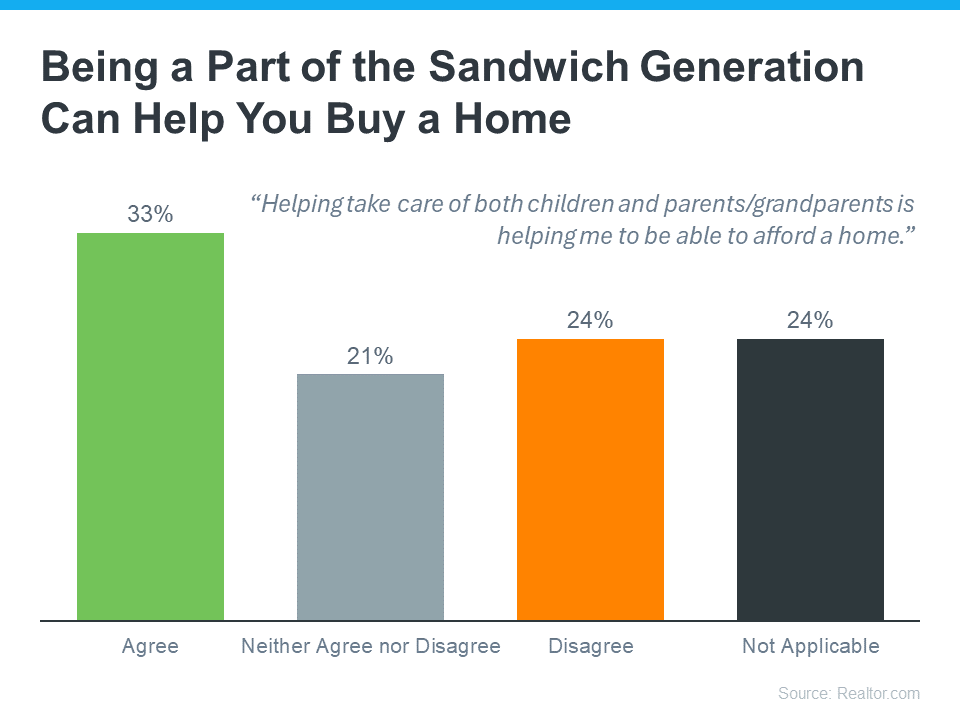
“Roughly one in six Americans take care of their children and their parents or grandparents at the same time.”
Are you a part of the Sandwich Generation? According to Realtor.com, that’s a name for the roughly one in six Americans who take care of their children and their parents or grandparents at the same time.
If that sounds familiar to you, juggling all the responsibilities involved certainly must have its challenges. But it turns out there’s one pretty significant benefit: it can actually make it a bit easier for you to buy a home.
How Can It Help You Buy a Home?
Realtor.com asked members of the Sandwich Generation if they agree or disagree that taking care of children and parents at the same time is helping them afford a home. A third of respondents said their situation made it easier to buy (see graph below):
 Here are a few ways their caretaking situation might be helping those 33% buy a home:
Here are a few ways their caretaking situation might be helping those 33% buy a home:
- Sharing Expenses: If you live in a multi-generational household, you can pool your resources and split the costs. Your parents might contribute to the mortgage or help with other bills. This can make a big difference, especially in today’s housing market. It may help you afford a larger home than you could on your own.
- Built-In Childcare: Having grandparents in the home could also save you money on childcare. They can help watch your kids while you’re at work, which means you can save on daycare costs too.
Beyond just the financial reasons, buying a multi-generational home has other advantages. The Profile of Home Buyers and Sellers from the National Association of Realtors (NAR) highlights some of the most popular, including:
- Easier To Care for Aging Parents: It’s more convenient to take care of someone when you live with them. Also, your elderly parents may very well be happier and healthier, thanks to more social interaction and a feeling of connectedness.
- Spending More Time Together: Once you live together, you get to spend more time and create even more lasting memories with your loved ones.
The Mortgage Reports sums it up this way:
“Buying a house with your parents can be a great way to ease caregiving, support young children, or simply bring loved ones closer together. And considering the steep rise in home prices over the last few years, it can make homeownership a lot more affordable.”
How a Real Estate Agent Can Help
If you’re in the Sandwich Generation and thinking about buying a multi-generational home, working with a local real estate agent is essential. Finding a home that works for so many people can be tricky. An agent will use their expertise to help you find one that meets the needs of, and has enough space for, everyone who’s going to live there.
Bottom Line
Being a part of the Sandwich Generation comes with its challenges – but it also might come with one truly great perk. If you’re looking to buy a home, your caregiving situation can actually make it a bit easier for you to afford a home. To learn more, let’s connect.
To view original article, visit Keeping Current Matters.
What’s Going on with Home Prices? Ask a Professional.
Your local real estate professional will be able to explain the latest trends in your specific market.
Prioritizing Your Wants and Needs as a Homebuyer in Today’s Market
It’s important to be mindful of what’s a necessity and what’s a nice-to-have when searching for a home.
3 Ways You Can Use Your Home Equity
A real estate professional is the best resource to help you understand how much home equity you have and advise you on some of the ways you can use it.
Your House Could Be the #1 Item on a Homebuyer’s List During the Holidays
Each year, homeowners planning to make a move are faced with a decision: sell their house during the holidays or wait.
What Homeowners Want To Know About Selling in Today’s Market
The key to success today is being realistic and working with a trusted real estate advisor.
Mortgage Rates Will Come Down, It’s Just a Matter of Time
As we get through the inflation battle and start to see that coming down, we should expect mortgage rates to follow.







.jpg )



